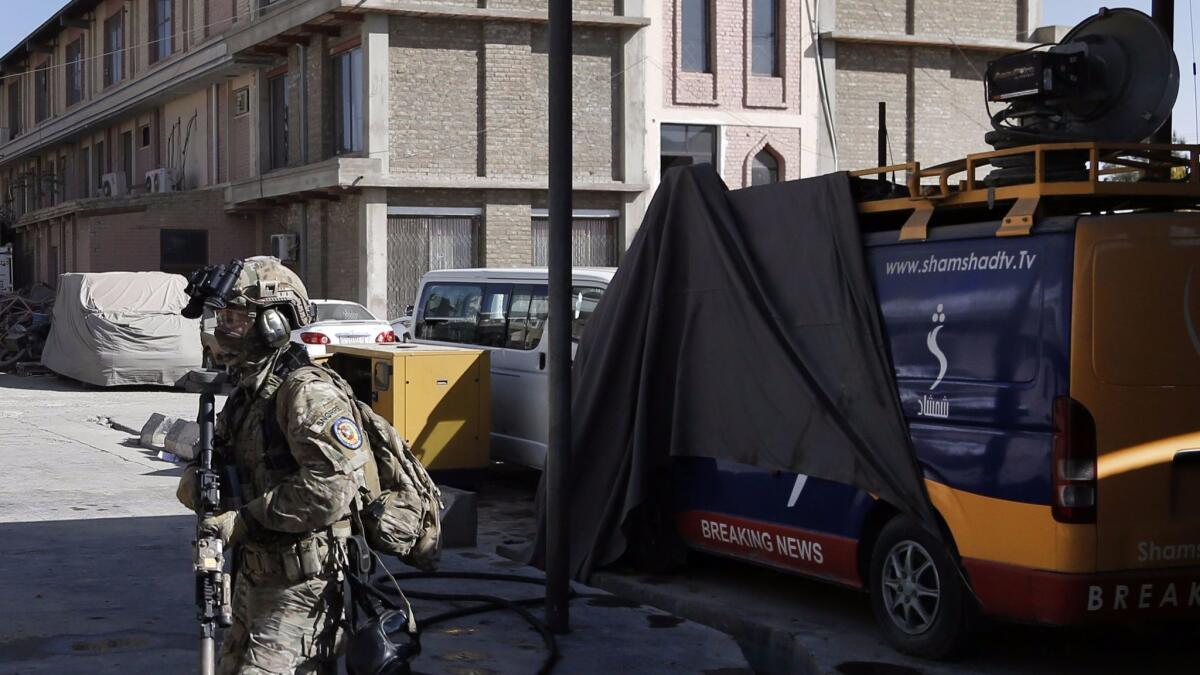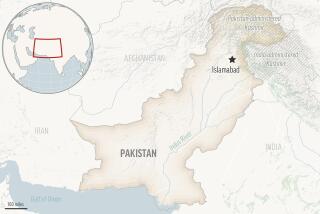An Afghan TV network was attacked. Its wounded anchor went back on the air with his hands bandaged

Reporting from KABUL, Afghanistan — Gunmen disguised as police officers stormed the headquarters of a television station in Kabul on Tuesday, killing at least two employees, wounding 20 and forcing the station off the air for nearly four hours in another audacious attack in the Afghan capital.
When Shamshad TV resumed broadcasting, Parwiz Safi sat at the anchor’s desk, his hands bandaged from injuries he suffered in the attack.
“We’re not sure who was behind the attack. That is for security forces to find out,” Safi said, his voice defiant. “We will continue our broadcast.”
He said that 20 of his colleagues had been wounded, some seriously, and were being treated at hospitals. Safi himself was treated and released before returning to the air. His first guest was Rahimullah Samandar, head of the national journalists’ union.
The broadcast struck a courageous note on a day that was otherwise disheartening: militants once again managed to penetrate central Kabul’s increasingly patchy veneer of security to strike at a symbol of openness and free expression.
The attack, which was claimed by supporters of Islamic State, began when two gunmen wearing police uniforms opened fire at the entrance to the TV station, said Nasrat Rahimi, deputy spokesman for Afghanistan’s interior ministry. About 150 TV station employees were believed to be inside.
Hashmat Stanikzai, a news anchor who watched the attack unfold on a CCTV camera from inside the compound, said that as he escaped the studio, he saw six people wounded and others laying on the ground, not moving.
The attackers were eventually shot and killed by Afghan security forces, Rahimi said.
Islamic State’s affiliate in South Asia claimed responsibility for the attack in a statement to reporters. It was the group’s second significant strike in Kabul in weeks, coming after a suicide bombing at a Shiite Muslim mosque last month that killed more than 50 people.
It was also the latest attack against Afghan media, one of the few success stories since the 2001 U.S.-led invasion toppled the repressive Taliban regime. A proliferation of private television channels has created one of the most vibrant journalism scenes in the region.
But Afghan journalists and media workers have also come under attack as security deteriorates across the country.
In May, six people were killed when Islamic State supporters attacked a state television station in the eastern city of Jalalabad. Two weeks later, two media workers were killed in a massive bombing in central Kabul’s diplomatic quarter.
“The attack on Shamshad TV is a horrific crime that tragically demonstrates the risks Afghanistan’s journalists face for their legitimate work,” said Amnesty International’s deputy South Asia director, Omar Waraich. “The Afghan authorities must do what they can to protect the country’s media, allowing them to work freely and without fear.”
Amnesty also slammed European countries for forcibly returning asylum-seekers to Afghanistan on the grounds that the country is not at war.
“This latest attack also underscores the grim fact that Kabul continues to be one of the most hazardous places in the country,” Waraich said.
Shamshad TV is owned by Fazel Karim, cultural advisor to Afghan President Ashraf Ghani. Its programming is mostly in the Pashto language spoken by Afghanistan’s largest ethnic group, the Pashtun, drawing audiences mainly in eastern and southern Afghanistan.
Ghani’s office condemned the attack, saying, “Terrorists can’t limit freedom of speech and media by launching criminal attacks.”
Special correspondent Faizy reported from Kabul and Times staff writer Bengali from Mumbai, India.
Follow @SBengali on Twitter for more news from South Asia
UPDATES:
6:30 a.m.: This article was updated throughout with staff reporting that includes additional details.
This article was originally published at 5:10 a.m.
More to Read
Sign up for Essential California
The most important California stories and recommendations in your inbox every morning.
You may occasionally receive promotional content from the Los Angeles Times.











